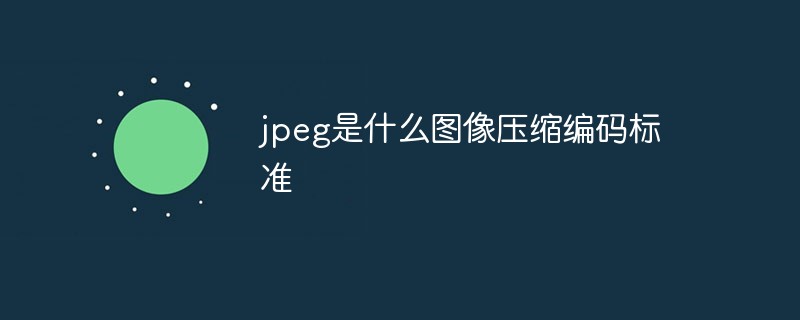jpeg是面向连续色调静止图像的压缩编码标准;其主要是采用预测编码、离散余弦变换以及熵编码的联合编码方式,以去除冗余的图像和彩色数据,属于有损压缩格式,它能够将图像压缩在很小的储存空间,一定程度上会造成图像数据的损伤。

本文操作环境:windows10系统、thinkpad t480电脑。
jpeg是面向连续色调静止图像的压缩编码标准,JPEG格式是最常用的图像文件格式,后缀名为.jpg或.jpeg。
JPEG( Joint Photographic Experts Group)即联合图像专家组,是用于连续色调静态图像压缩的一种标准,文件后缀名为.jpg或.jpeg,是最常用的图像文件格式。其主要是采用预测编码(DPCM)、离散余弦变换(DCT)以及熵编码的联合编码方式,以去除冗余的图像和彩色数据,属于有损压缩格式,它能够将图像压缩在很小的储存空间,一定程度上会造成图像数据的损伤。尤其是使用过高的压缩比例,将使最终解压缩后恢复的图像质量降低,如果追求高品质图像,则不宜采用过高的压缩比例。
然而,JPEG压缩技术十分先进,它可以用有损压缩方式去除冗余的图像数据,换句话说,就是可以用较少的磁盘空间得到较好的图像品质。而且JPEG是一种很灵活的格式,具有调节图像质量的功能,它允许用不同的压缩比例对文件进行压缩,支持多种压缩级别,压缩比率通常在10;1到40;1,压缩比越大,图像品质就越低;相反地,压缩比越小,图像品质就越高。同一幅图像,用JPEG格式存储的文件是其他类型文件的1/10~1/20,通常只有几十KB,质量损失较小,基本无法看出。JPEG格式压缩的主要是高频信息,对色彩的信息保留较好,适合应用于互联网;它可减少图像的传输时间,支持24位真彩色;也普遍应用于需要连续色调的图像中。
PEG格式可分为标准JPEG、渐进式JPEG及JPEG2000三种格式。
1. 标准JPEG格式;此类型在网页下载时只能由上而下依序显示图像,直到图像资料全部下载完毕,才能看到图像全貌。
2. 渐进式JPEG;此类型在网页下载时,先呈现出图像的粗略外观后,再慢慢地呈现出完整的内容,而且存成渐进式JPG格式的文档比存成标准JPG格式的文档要来得小,所以如果要在网页上使用图像,可以多用这种格式。
3. JPEG2000;它是新一代的影像压缩法,压缩品质更高,并可改善在无线传输时,常因信号不稳造成马赛克现象及位置错乱的情况,改善传输的品质。
想要查阅更多相关文章,请访问PHP中文网!!
以上就是jpeg是什么图像压缩编码标准的详细内容,更多请关注php中文网其它相关文章!

每个人都需要一台速度更快、更稳定的 PC。随着时间的推移,垃圾文件、旧注册表数据和不必要的后台进程会占用资源并降低性能。幸运的是,许多工具可以让 Windows 保持平稳运行。

Copyright 2014-2025 //m.sbmmt.com/ All Rights Reserved | php.cn | 湘ICP备2023035733号